Unit 5 Our school life Topic 1 I usually come to school by subway.SectionC课件25张PPT
文档属性
| 名称 | Unit 5 Our school life Topic 1 I usually come to school by subway.SectionC课件25张PPT |
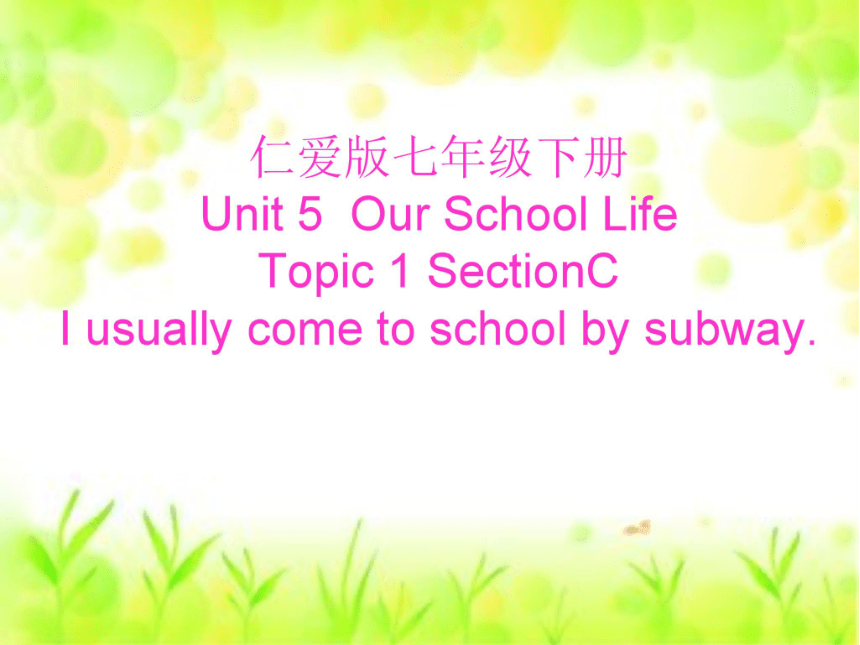
|
|
| 格式 | zip | ||
| 文件大小 | 13.6MB | ||
| 资源类型 | 教案 | ||
| 版本资源 | 仁爱科普版 | ||
| 科目 | 英语 | ||
| 更新时间 | 2020-02-08 00:00:00 | ||
图片预览

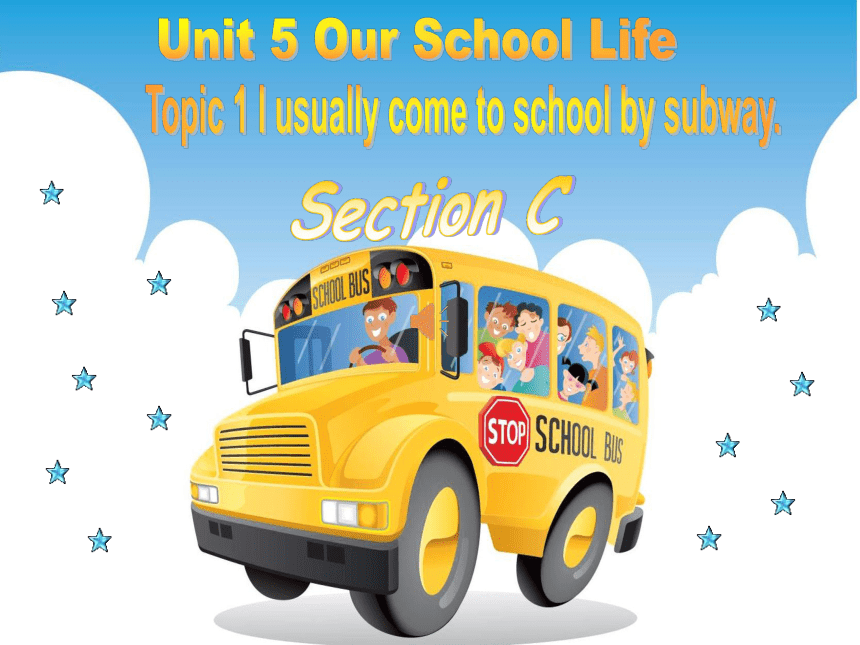
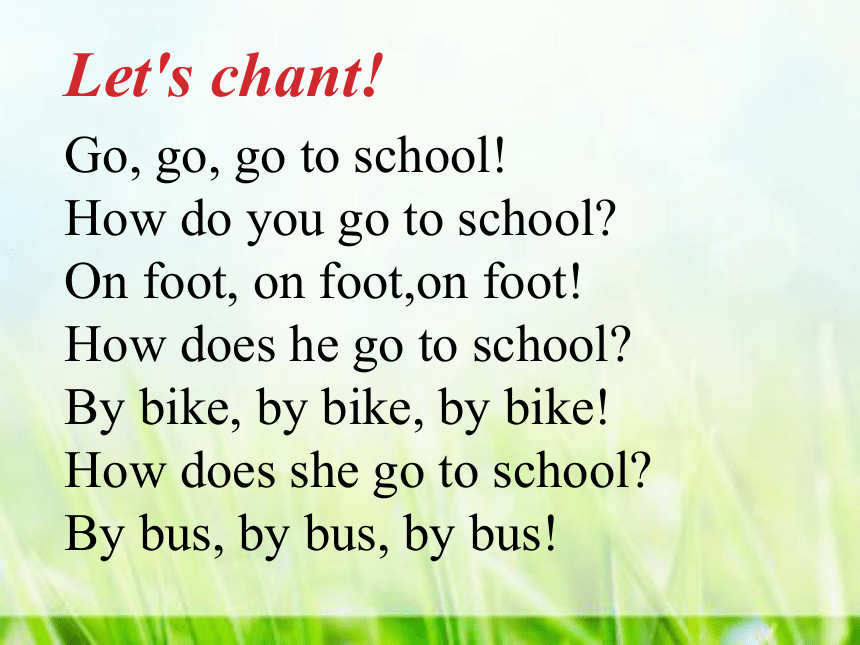
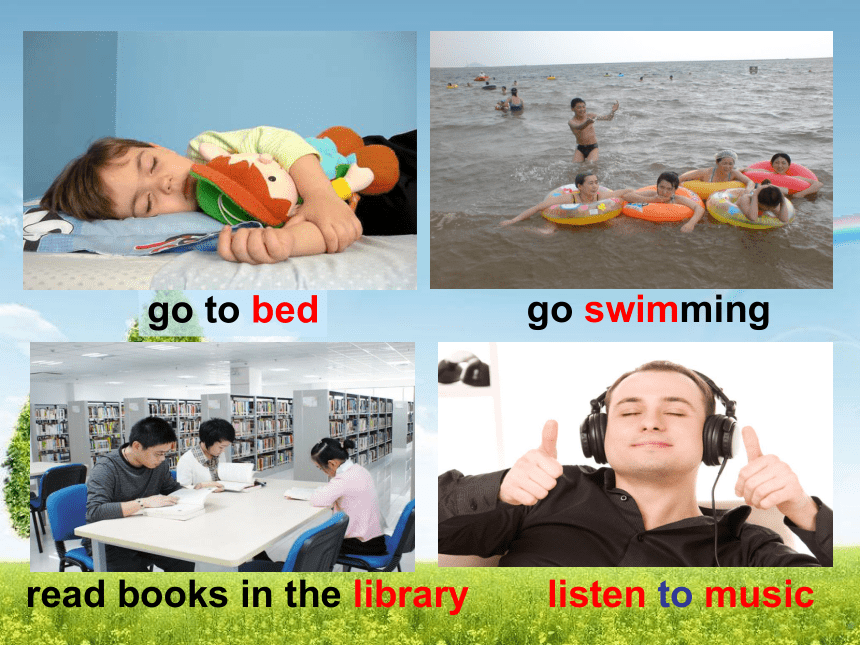

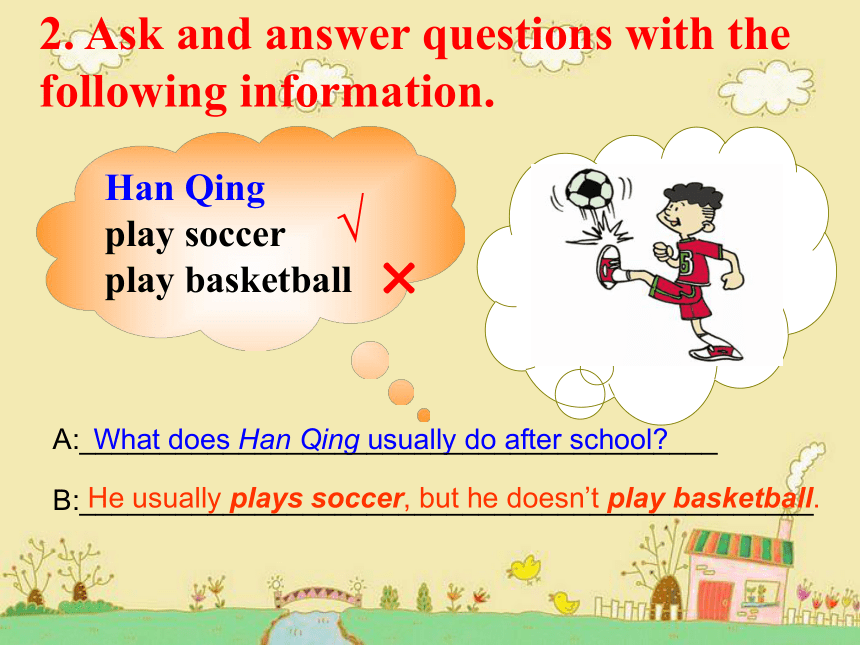
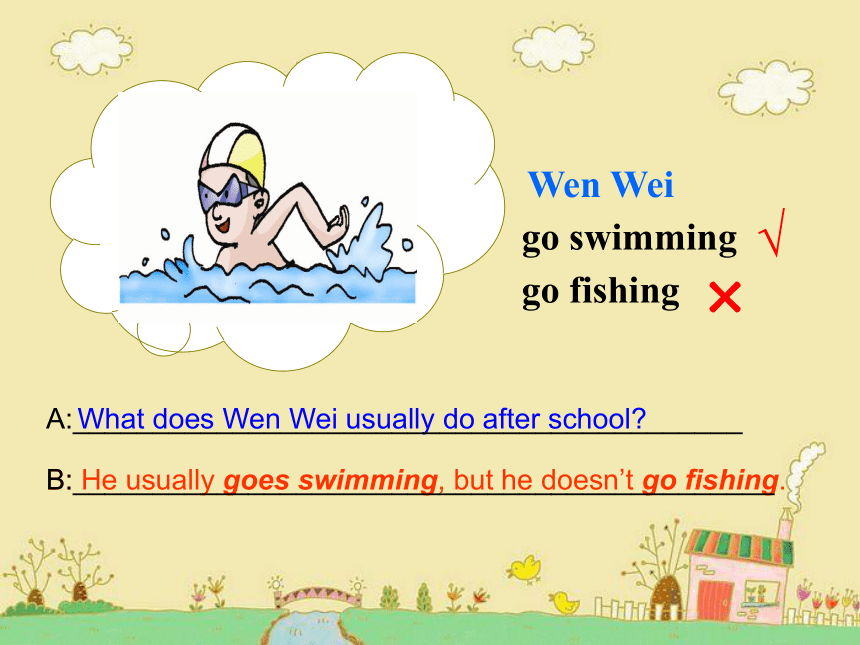
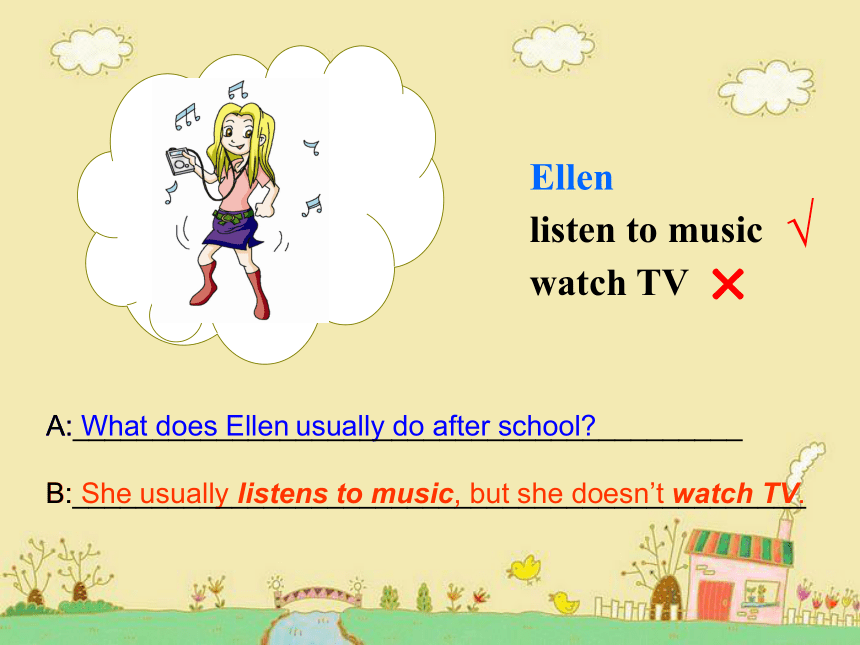
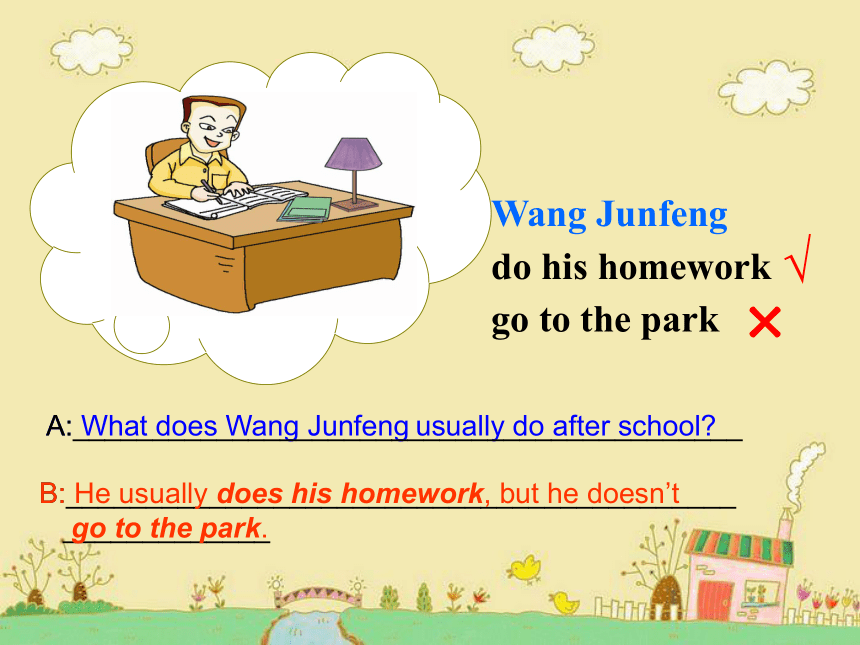
文档简介
(共25张PPT)
Let's chant!
Go, go, go to school!
How do you go to school?
On foot, on foot,on foot!
How does he go to school?
By bike, by bike, by bike!
How does she go to school?
By bus, by bus, by bus!
go to bed
go swimming
read books in the library
listen to music
play basketball
play soccer
2. Ask and answer questions with the following information.
Han Qing
play soccer
play basketball
What does Han Qing usually do after school?
He usually plays soccer, but he doesn’t play basketball.
A:________________________________________
B:______________________________________________
√
×
What does Wen Wei usually do after school?
B: He usually goes swimming, but he doesn’t go fishing.
Wen Wei
go swimming
go fishing
A:__________________________________________
B:____________________________________________
√
×
A: What does Ellen usually do after school?
B: She usually listens to music, but she doesn’t watch TV.
Ellen
listen to music
watch TV
A:__________________________________________
B:______________________________________________
√
×
B:__________________________________________
_____________
A: What does Wang Junfeng usually do after school?
B: He usually does his homework, but he doesn’t
go to the park.
Wang Junfeng
do his homework
go to the park
A:__________________________________________
√
×
meet friends
Do you often...?
How often do you …?
— How often do you meet friends?
— Once a week.
Do you often...?
How often do you…?
watch TV
— How often do you watch TV?
— I watch TV twice a week.
— How often do you listen to music?
listen to music
Do you often...?
How often do you …?
— Three times a week.
go swimming
— How often do you go swimming?
Do you often...?
How often do you …?
— Very often.
Do you often…?
How often do you …?
cook
— How often do you cook?
— Every day.
Example:
Activity: meet friends watch TV listen to music
read books cook go to the zoo play soccer
Frequency: once a week twice a week three times a week
very often every day seldom never
3. Work in pairs. Make up new conversations with the words and phrases in the box.
A: Do you often read books in the library?
B: Yes, I do. / No, I don’t.
A: How often do you come to the library?
B: Three times a week.
eight o’clock
nine o five
ten fifteen / a quarter past ten
eleven thirty / half past eleven
twelve forty-five / a quarter to one
seventeen fifty / ten to eighteen
Tell the time
8:00
9:05
10:15
11:30
12:45
17:50
1. 上课
2. 放学后
3. 踢足球
4. 坐地铁回家
5. 到家
6. 晚饭后
7. 做作业
8. 一会儿
have classes
after school
play soccer
take a subway home
get home
after dinner
do one's homework
for a short time
Read the passage and answer the questions.
(1)When do the classes begin?
(2)How many classes does she have in the morning?
(3)Where does she have lunch?
(4)When does she play soccer with her classmates?
(5) How does she go home?
Classes begin at eight.
She has four classes in the morning.
She takes the subway home.
She has lunch at school.
She plays soccer after school.
在学校
放学后
1b. Work in groups of three. Discuss the following pictures and retell the passage in 1a.
Write down phrases according to the pictures of 1b, then retell the passage.
A. gets up--has breakfast--goes to school--has classes
B. has lunch--has classes--plays soccer--takes a subway
C. has dinner--does her homework--watches TV--goes to bed
1.妈妈一星期去一次购物。
2.我们一年去探望两次爷爷。
3.她从来不吃鸡肉。
My mother goes shopping
We go to visit grandpa
She eats chicken.
4.She goes to the movies three times
a month. (对划线部分提问)
___ _____ _____ she go to the movies?
5.I practice the piano every day.
(对划线部分提问)
_____ _____ do you practice the piano?
How often does
How often
__ __ __.
__ __ __.
__
once a week
twice a year
never
We learn: 1. some words: begin, after, basketball, swim
listen, music, library, week, once, twice
2. some phrases: at school, go to bed, listen
to music, play basketball / soccer
3. some sentences: What do you usually do
after school? We can: 1. talk about the daily activities.
eg. I often cook in the evening.
2. use the Present Simple Tense correctly.
e.g. She usually gets up at 7:00.
1c. Talk with your partner about
your day with the help of 1a.
I usually get up at … in the morning. At … o’clock, I have breakfast …
… is my friend/classmate. He/She usually gets up at … in the morning …
Life is movement.
Reading is to the mind while exercise to the body.
Let's chant!
Go, go, go to school!
How do you go to school?
On foot, on foot,on foot!
How does he go to school?
By bike, by bike, by bike!
How does she go to school?
By bus, by bus, by bus!
go to bed
go swimming
read books in the library
listen to music
play basketball
play soccer
2. Ask and answer questions with the following information.
Han Qing
play soccer
play basketball
What does Han Qing usually do after school?
He usually plays soccer, but he doesn’t play basketball.
A:________________________________________
B:______________________________________________
√
×
What does Wen Wei usually do after school?
B: He usually goes swimming, but he doesn’t go fishing.
Wen Wei
go swimming
go fishing
A:__________________________________________
B:____________________________________________
√
×
A: What does Ellen usually do after school?
B: She usually listens to music, but she doesn’t watch TV.
Ellen
listen to music
watch TV
A:__________________________________________
B:______________________________________________
√
×
B:__________________________________________
_____________
A: What does Wang Junfeng usually do after school?
B: He usually does his homework, but he doesn’t
go to the park.
Wang Junfeng
do his homework
go to the park
A:__________________________________________
√
×
meet friends
Do you often...?
How often do you …?
— How often do you meet friends?
— Once a week.
Do you often...?
How often do you…?
watch TV
— How often do you watch TV?
— I watch TV twice a week.
— How often do you listen to music?
listen to music
Do you often...?
How often do you …?
— Three times a week.
go swimming
— How often do you go swimming?
Do you often...?
How often do you …?
— Very often.
Do you often…?
How often do you …?
cook
— How often do you cook?
— Every day.
Example:
Activity: meet friends watch TV listen to music
read books cook go to the zoo play soccer
Frequency: once a week twice a week three times a week
very often every day seldom never
3. Work in pairs. Make up new conversations with the words and phrases in the box.
A: Do you often read books in the library?
B: Yes, I do. / No, I don’t.
A: How often do you come to the library?
B: Three times a week.
eight o’clock
nine o five
ten fifteen / a quarter past ten
eleven thirty / half past eleven
twelve forty-five / a quarter to one
seventeen fifty / ten to eighteen
Tell the time
8:00
9:05
10:15
11:30
12:45
17:50
1. 上课
2. 放学后
3. 踢足球
4. 坐地铁回家
5. 到家
6. 晚饭后
7. 做作业
8. 一会儿
have classes
after school
play soccer
take a subway home
get home
after dinner
do one's homework
for a short time
Read the passage and answer the questions.
(1)When do the classes begin?
(2)How many classes does she have in the morning?
(3)Where does she have lunch?
(4)When does she play soccer with her classmates?
(5) How does she go home?
Classes begin at eight.
She has four classes in the morning.
She takes the subway home.
She has lunch at school.
She plays soccer after school.
在学校
放学后
1b. Work in groups of three. Discuss the following pictures and retell the passage in 1a.
Write down phrases according to the pictures of 1b, then retell the passage.
A. gets up--has breakfast--goes to school--has classes
B. has lunch--has classes--plays soccer--takes a subway
C. has dinner--does her homework--watches TV--goes to bed
1.妈妈一星期去一次购物。
2.我们一年去探望两次爷爷。
3.她从来不吃鸡肉。
My mother goes shopping
We go to visit grandpa
She eats chicken.
4.She goes to the movies three times
a month. (对划线部分提问)
___ _____ _____ she go to the movies?
5.I practice the piano every day.
(对划线部分提问)
_____ _____ do you practice the piano?
How often does
How often
__ __ __.
__ __ __.
__
once a week
twice a year
never
We learn: 1. some words: begin, after, basketball, swim
listen, music, library, week, once, twice
2. some phrases: at school, go to bed, listen
to music, play basketball / soccer
3. some sentences: What do you usually do
after school? We can: 1. talk about the daily activities.
eg. I often cook in the evening.
2. use the Present Simple Tense correctly.
e.g. She usually gets up at 7:00.
1c. Talk with your partner about
your day with the help of 1a.
I usually get up at … in the morning. At … o’clock, I have breakfast …
… is my friend/classmate. He/She usually gets up at … in the morning …
Life is movement.
Reading is to the mind while exercise to the body.
同课章节目录
- Unit 5 Our school life
- Topic 1 I usually come to school by subway.
- Topic 2 A few students are running around the play
- Topic 3 My school life is very interesting.
- Unit 6 Our local area
- Topic 1 Is there a computer in your study?
- Topic 2 My home is in an apartment building.
- Topic 3 Which is the way to the hospital?
- Review of Units 5-6
- Unit 7 The Birthday
- Topic 1 When is your birthday?
- Topic 2 Can you sing an English song?
- Topic 3 Everyone had a good time.
- Unit 8 The seasons and the Weathe
- Topic 1 What's the weather like in summer?
- Topic 2 The summer holidays are coming.
- Topic 3 Let’s celebrate!
- Review of Units 7-8
- 旧版资料
- Unit 5 Our School Life
- Unit 6 Our Local Area
- Unit 7 The Birthday
- Unit 8 The seasons and the Weathe
- Unit 7 Celebrating the Birthday(老版本)
